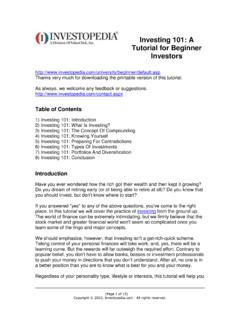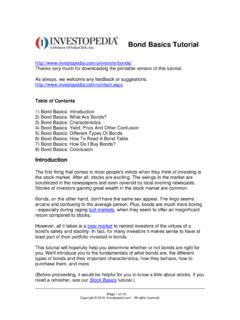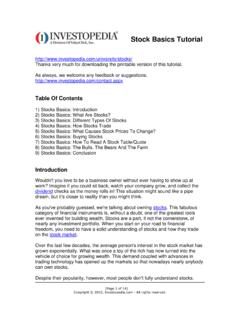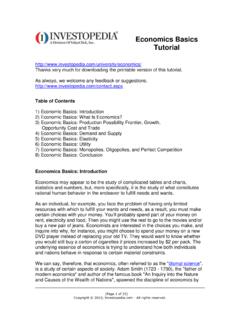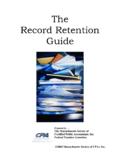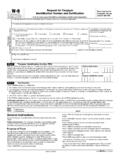Transcription of Accounting Basics - i.investopedia.com
1 The resource for investing and personal finance education. Accounting Basics By Bob Schneider Thanks very much for downloading the printable version of this tutorial. As always, we welcome any feedback or suggestions. Table of Contents 1) Accounting Basics : Introduction 2) Accounting Basics : History Of Accounting 3) Accounting Basics : Branches Of Accounting 4) Accounting Basics : The Basics 5) Accounting Basics : The Accounting Process 6) Accounting Basics : Financial Statements 7) Accounting Basics : Financial Reporting Introduction Accounting is a glorious but misunderstood field. The popular view is that it's mostly mind-numbing number-crunching; it certainly has some of that, but it's also a rich intellectual pursuit with an abundance of compelling and controversial issues.
2 Accountants are often stereotyped as soulless drones laboring listlessly in the bowels of corporate bureaucracies. But many accountants will tell you that it's people skills, not technical knowledge, that are crucial to their success. And although it's often thought of as a discipline of pinpoint exactitude with rigid rules, in practice accountants rely heavily on best estimates and educated guesses that require careful judgment and strong imagination. Actually, stereotyping Accounting and accountants, either positively or negatively, is useless because Accounting involves so many different activities. The short-but-sweet This tutorial can be found at: (Page 1 of 17). Copyright 2010, - All rights reserved. the resource for investing and personal finance education.
3 Description of Accounting is "the language of business." A more formal definition is offered by The American Accounting Association: "The process of identifying, measuring and communicating economic information to permit informed judgments and decisions by users of the information.". However defined, Accounting plays a vital role in facilitating all forms of economic activity in the private, public and nonprofit sectors, in endeavors ranging from coal mining to community theater to municipal finance. The History Of Accounting The name that looms largest in early Accounting history is Luca Pacioli, who in 1494. first described the system of double-entry bookkeeping used by Venetian merchants in his Summa de Arithmetica, Geometria, Proportioni et Proportionalita.
4 Of course, businesses and governments had been recording business information long before the Venetians. But it was Pacioli who was the first to describe the system of debits and credits in journals and ledgers that is still the basis of today's Accounting systems. The industrial revolution spurred the need for more advanced cost Accounting systems, and the development of corporations created much larger classes of external capital providers - shareowners and bondholders - who were not part of the firm's management but had a vital interest in its results. The rising public status of accountants helped to transform Accounting into a profession, first in the United Kingdom and then in the United States. In 1887, thirty-one accountants joined together to create the American Association of Public Accountants.
5 The first standardized test for accountants was given a decade later, and the first CPAs were licensed in 1896. The Great Depression led to the creation of the Securities and Exchange Commission (SEC) in 1934. Henceforth all publicly-traded companies had to file periodic reports with the Commission to be certified by members of the Accounting profession. The American Institute of Certified Public Accountants (AICPA) and its predecessors had responsibility for setting Accounting standards until 1973, when the Financial Accounting Standards Board (FASB) was established. The industry thrived in the late 20th century, as the large Accounting firms expanded their services beyond the traditional auditing function to many forms of consulting.
6 The Enron scandals in 2001, however, had broad repercussions for the Accounting industry. One of the top firms, Arthur Andersen, went out of business and, under the Sarbanes-Oxley Act, accountants faced tougher restrictions on their consulting engagements. One of the paradoxes of the profession, however, is that Accounting scandals generate more work for accountants, and demand for their services continued to boom throughout the early part of the 21st century. This tutorial can be found at: (Page 2 of 17). Copyright 2010, - All rights reserved. the resource for investing and personal finance education. Branches Of Accounting Accounting can be divided into several areas of activity. These can certainly overlap and they are often closely intertwined.
7 But it's still useful to distinguish them, not least because Accounting professionals tend to organize themselves around these various specialties. Financial Accounting Financial Accounting is the periodic reporting of a company's financial position and the results of operations to external parties through financial statements, which ordinarily include the balance sheet (statement of financial condition), income statement (the profit and loss statement, or P&L), and statement of cash flows. A statement of changes in owners' equity is also often prepared. Financial statements are relied upon by suppliers of capital - , shareholders, bondholders and banks - as well as customers, suppliers, government agencies and policymakers.
8 There's little use in issuing financial statements if each company makes up its own rules about what and how to report. When preparing statements, American companies use Generally Accepted Accounting Principles, or GAAP. The primary source of GAAP is the rules published by the FASB and its predecessors; but GAAP also derives from the work done by the SEC and the AICPA, as well standard industry practices. Management Accounting Where financial Accounting focuses on external users, management Accounting emphasizes the preparation and analysis of Accounting information within the organization. According to the Institute of Management Accountants, it includes " designing and evaluating business processes, budgeting and forecasting, implementing and monitoring internal controls, and analyzing, synthesizing and aggregating information to help drive economic value.
9 ". A primary concern of management Accounting is the allocation of costs; indeed, much of what now is considered management Accounting used to be called cost Accounting . Although a seemingly mundane pursuit, how to measure cost is critical, difficult and controversial. In recent years, management accountants have developed new approaches like activity-based costing (ABC) and target costing, but they continue to debate how best to provide and use cost information for management decision-making. Auditing Auditing is the examination and verification of company accounts and the firm's system of internal control. There is both external and internal auditing. External auditors are independent firms that inspect the accounts of an entity and render an opinion on whether its statements conform to GAAP and present fairly the financial position of the company and the results of operations.
10 In the , four huge firms known as the Big This tutorial can be found at: (Page 3 of 17). Copyright 2010, - All rights reserved. the resource for investing and personal finance education. Four - PricewaterhouseCoopers, Deloitte Touche Tomatsu, Ernst & Young, and KPMG - dominate the auditing of large corporations and institutions. The group was traditionally known as the Big Eight, contracted to a Big Five through mergers and was reduced to its present number in 2002 with the meltdown of Arthur Andersen in the wake of the Enron scandals. The external auditor's primary obligation is to users of financial statements outside the organization. The internal auditor's primary responsibility is to company management. According to the Institute of Internal Auditors (IIA), the internal auditor evaluates the risks the organization faces with respect to governance, operations and information systems.
